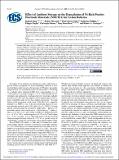Effect of Ambient Storage on the Degradation of Ni-Rich Positive Electrode Materials (NMC811) for Li-Ion Batteries
Author(s)
Maglia, Filippo; Stinner, Christoph; Jung, Roland; Morasch, Robert; Karayaylali, Pinar; Phillips, Katherine Reece; Shao-Horn, Yang; Gasteiger, Hubert A.; ... Show more Show less
DownloadJ. Electrochem. Soc.-2018-Jung-A132-41.pdf (998.5Kb)
PUBLISHER_CC
Publisher with Creative Commons License
Creative Commons Attribution
Terms of use
Metadata
Show full item recordAbstract
Layered LiNi[subscript 0.8]Mn[subscript 0.1]Co[subscript 0.1]O[subscript 2](NMC811) is one of the high-energy positive electrode (cathode) materials for next generation Li-ion batteries. However, compared to the structurally similar LiNi[subscript 1/3]Mn[subscript 1/3]Co[subscript1/3]O[subscript 2](NMC111), it can suffer from a shorter lifetime due to its higher surface reactivity. This work studied and compared the formation of surface contaminations on NMC811 and NMC111 when stored under ambient conditions using electrochemical cycling, Raman spectroscopy, and X-ray photoelectron spectroscopy. NMC811 was found to develop a surface layer of up to ∼10 nm thickness that was mostly composed of nickel carbonate species mixed with minor quantities of hydroxide and water after ambient storage for 1 year, while no significant changes were observed on the NMC111 surface. The amount of carbonate species was quantified by gas chromatographic (GC) detection of carbon dioxide generated when the NMC particles were dispersed in hydrochloric acid. Surface impurity species formed on NMC811 upon ambient storage not only lead to a significant delithiation voltage peak in the first charge, but also markedly reduce the cycling stability of NMC811-graphite cells due to significantly growing polarization of the NMC811 electrode. Keywords: NMC811; Storage; Surface Reactivity
Date issued
2018-01Department
Massachusetts Institute of Technology. Department of Materials Science and Engineering; Massachusetts Institute of Technology. Department of Mechanical Engineering; Massachusetts Institute of Technology. Electrochemical Energy Laboratory; Massachusetts Institute of Technology. Research Laboratory of ElectronicsJournal
Journal of The Electrochemical Society
Publisher
Electrochemical Society
Citation
Jung, Roland et al. “Effect of Ambient Storage on the Degradation of Ni-Rich Positive Electrode Materials (NMC811) for Li-Ion Batteries.” Journal of The Electrochemical Society 165, 2 (2018): A132–A141 © 2018 The Author(s)
Version: Final published version
ISSN
0013-4651
1945-7111